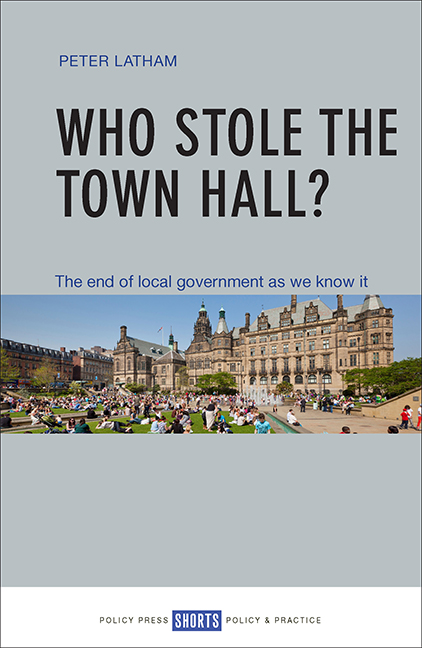Book contents
- Frontmatter
- Dedication
- Contents
- List of tables
- Acknowledgements
- Foreword
- About the author
- List of abbreviations
- Introduction
- 1 The Localism Act, Open Public Services and the neoliberalisation of councils
- 2 Imposed ‘metro’ mayors: new wine in old bottles
- 3 Police and Crime Commissioners: another ‘half-baked import’
- 4 Local government finance
- 5 Towards a new basis for federal, regional and local democracy
- References
- Index
3 - Police and Crime Commissioners: another ‘half-baked import’
Published online by Cambridge University Press: 05 April 2022
- Frontmatter
- Dedication
- Contents
- List of tables
- Acknowledgements
- Foreword
- About the author
- List of abbreviations
- Introduction
- 1 The Localism Act, Open Public Services and the neoliberalisation of councils
- 2 Imposed ‘metro’ mayors: new wine in old bottles
- 3 Police and Crime Commissioners: another ‘half-baked import’
- 4 Local government finance
- 5 Towards a new basis for federal, regional and local democracy
- References
- Index
Summary
Directly elected police and crime commissioners (PCCs), according to Shami Chakrabarti, are ‘a half-baked import from the US, where political “sheriffs” have watched over widespread corruption and damaged race relations for years’ (2012, p 21). This chapter discusses the police governance system before PCCs; the Police Reform and Social Responsibility Act 2011; the main arguments against PCCs; why they should be abolished; and what should replace them.
The governance system before PCCs
Following the 1960–62 Royal Commission Report on the constitutional position of the police throughout Great Britain – itself a response to police abuse scandals – the 1964 Police Act introduced police authorities with two-thirds elected members in county or borough councils and one-third magistrates. Several of the amalgamated forces formed under the 1964 Act had short existences, as a wholesale reorganisation of local government in England and Wales outside London was carried out in 1974 under the Local Government Act 1972. Police areas were realigned to correspond to one or more of the non-metropolitan or metropolitan counties created by the 1972 legislation. In the 1980s, especially during the miners’ strike, the party-political debate about police accountability was at its height. Tory rhetoric resisted the Labour call for democratic control of policing, invoking the threat of politicisation and defending the strong independence doctrine. However, in the early 1990s, as Labour became ‘New’ – the era of Michael Howard as Home Secretary versus Tony Blair as shadow – a new consensus around tough ‘law and order’ developed and has reigned ever since.
The 43 forces in England and Wales varied significantly in terms of population, geographical size, crime levels and trends; and the Police and Magistrates’ Courts Act 1994 altered the composition of the authorities in England and Wales, with independent members being added. A long list, compiled from applications received, was submitted by a committee of elected members and magistrates to the Home Office. That committee then appointed the independent members from a short list returned by the Home Office. Typically, a police authority comprised 17 members, of whom nine were elected members drawn from the local authority or authorities for the force area and who would be reflective of the political make-up of those authorities.
- Type
- Chapter
- Information
- Who Stole the Town Hall?The End of Local Government as We Know It, pp. 71 - 94Publisher: Bristol University PressPrint publication year: 2017



